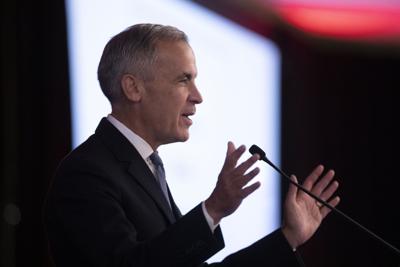OTTAWA — Fears of a spiralling conflict in Europe spiked Wednesday after NATO scrambled jets and defence systems to shoot down Russian drones that entered Poland’s airspace during an overnight attack on Ukraine. The intrusion sparked condemnation from Prime Minister Mark Carney and prompted the alliance to trigger special talks on how to respond, with accusations that Russia risked escalating tensions that could pull nuclear-armed adversaries into the ongoing eastern European war.Ìý
Polish Prime Minister Donald Tusk  “the situation brings us the closest we have been to open conflict since World War Two,” while several other leaders alleged Russia deliberately sent the drones into Poland — although Canada’s defence minister said the question of intent had not yet been answered.Ìý
In Brussels, NATO Secretary General Mark Rutte told reporters that several alliance member countries helped shoot down “numerous” drones from Russia that “violated” Polish airspace and that a “full assessment of the incident is ongoing.”
The alliance also held talks Wednesday — Canada’s NATO ambassador Heidi Hulan was among the participants — after Poland requested consultations under NATO’s Article 4, which is triggered when a member declares the territory, independence or security of any ally is threatened.Ìý
“It is absolutely reckless, it is absolutely dangerous,” Rutte said, while praising NATO allies including Poland, the Netherlands, Italy and Germany for responding to the drone incursion.Ìý
“Last night showed that we are able to defend every inch of NATO territory including, of course, its airspace.”Â
Russia denied that its overnight attack on Ukraine included any targets on Polish territory, according to multiple reports citing the country’s defence ministry.Ìý
Carney, meanwhile, was among those to condemn Russia for the incident. In a post on social media, the prime minister said Canada is “closely co-ordinating” with Poland and other NATO members, and accused Russian President Vladimir Putin of showing a “total disregard” for efforts to end the war in Ukraine.
“We will remain vigilant against Russia’s attempts to widen and prolong the conflict with Ukraine,” Carney’s post said.Ìý
RadosÅ‚aw Sikorski, Poland’s foreign affairs minister, said in a  that the country’s airspace was breached 19 times overnight by “drones manufactured in Russia” that “deliberately” targeted and damaged some property in Poland. Several European leaders also alleged Russia knowingly sent the drones into Poland, with some suggesting the move was a “test” of NATO’s resolve, the Associated Press .Ìý
Sikorski accused Russia of “default Soviet responses” of lies about what happened and called on NATO to bolster its eastern flank, where roughly 2,000 Canadian troops are leading a multinational battle force to deter any attack into Latvia — a country that, like Poland, has a history of Soviet oppression.
“It’s time for the leadership of Russia to understand that the attempt to rebuild Europe’s last empire is doomed to fail,” he said.Ìý
Ursula von der Leyen, president of the European Union Commission, on social media that the drones included more than 10 Shahed attack vehicles, while the New York Times Wednesday that nine drones recovered were unarmed dummies often used to confuse air defence efforts.Ìý
Later Wednesday, Defence Minister David McGuinty said the question of Russia’s intent is still being assessed at NATO, even as he cast doubt on Russia’s credibility because of its alleged hesitation to end the conflict.Ìý
Appearing with McGuinty at the Liberal government’s caucus meeting in Edmonton, Foreign Affairs Minister Anita Anand accused Russia of violating Poland’s sovereignty. When asked about the prospect of NATO invoking Article 5 — its central collective defence provision that declares an attack against one member is an attack on all of them — Anand said Canada stands with Poland and that NATO will decide on its response as allies and partners in the alliance.
Kerry Buck, who was Canada’s ambassador to NATO from 2015 to 2019, told the Star that the situation poses a real danger that the Ukraine conflict could escalate into a broader war. She said Poland’s invocation of Article 4 is likely meant to signal to Russia that NATO is interpreting the drone intrusion as a provocation. More sanctions against Russia and improvements to NATO air defence systems could follow, she said.Ìý
As for Russia, Buck said the rationale for such an intrusion is to try to cast NATO as a weak alliance, and to raise questions about its commitment to collective defence, since Moscow has a long-standing opposition to more countries — including Ukraine — joining the organization. “NATO seems less strong if Russia does something like this and NATO does nothing,” she said, summarizing her understanding of Russia’s gambit.
In light of questions about the United States’ commitment to Ukraine and European defence under President Donald Trump, it also makes sense that Russia would test NATO in this way, Buck said. But she doubted Russia would go further and take action that would trigger a broader conflict with NATO.Ìý
“For them to do something that would be immediately seen as an attack and move into all-out war — it’s not in their interest to do it,” she said, “but I’ve been wrong before.”Â
Error! Sorry, there was an error processing your request.
There was a problem with the recaptcha. Please try again.
You may unsubscribe at any time. By signing up, you agree to our and . This site is protected by reCAPTCHA and the Google and apply.
Want more of the latest from us? Sign up for more at our newsletter page.



























To join the conversation set a first and last name in your user profile.
Sign in or register for free to join the Conversation